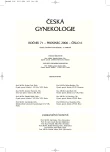-
Medical journals
- Career
Clinical Comparison of Laparoscopy-Assisted Vaginal Hysterectomy (LAVH) and Total Laparoscopy Hysterectomy (TLH) in Women with Benign Disease of Uterus – a Prospective Randomized Study
Authors: Jan Drahoňovský; M. Pán; Š. Barešová; E. Kučera; J. Feyereisl
Authors‘ workplace: Ústav pro péči o matku a dítě, Praha, vedoucí doc. MUDr. J. Feyereisl, CSc.
Published in: Ceska Gynekol 2006; 71(6): 431-437
Category: Original Article
Overview
Objective:
To compare two techniques of hysterectomy.Design:
Prospective, randomised study.Setting:
Institute for the Mother and Child Care, Prague.Methods:
85 patients randomized into two groups – laparoscopically assisted vaginal hysterectomy (LAVH) and total laparoscopic hysterectomy (TLH). The criteria studied were length of the procedure, blood loss, complication rate, uterus weight, rate of conversions, consumption of analgesics, inflammatory response. Results: Mean length of the procedure for LAVH, TLH was 85 and 111 min, respectivelly, the mean blood loss 306 and 184 ml. There was no difference in inflammatory response and use of antibiotics. Consumption of analgesics was higher in the TLH group. Conversions to laparotomy occurred only in the LAVH group. Only in the TLH group we noticed serious postoperative complications.Conclusion:
LAVH seems to be the preferable technique of hysterectomy for benign diseases of the uterus.Key words:
hysterectomy, minimally invasive surgery, laparoscopy.
Labels
Paediatric gynaecology Gynaecology and obstetrics Reproduction medicine
Article was published inCzech Gynaecology

2006 Issue 6-
All articles in this issue
- Clinical Comparison of Laparoscopy-Assisted Vaginal Hysterectomy (LAVH) and Total Laparoscopy Hysterectomy (TLH) in Women with Benign Disease of Uterus – a Prospective Randomized Study
- The Impact of Total Abdominal and Laparoscopically Assisted Vaginal Hysterectomy on the Development of Urine Incontinence
- Glandular Premalignant Lesions of the Uterine Cervix
- Possibile Utilization the Vaginal Ultrasonography as the Prebioptic Method in Diagnostics of Cancer of Endometrium through the Mediation the So-called EMI (endometrium/myometrium index)
- New Options in Reconstructive Pelvic Floor Surgery and Surgery in Urogynecology
- A Survey of Surgical Techniques Used for the Correction of Statics Disorders of Pelvic Floor
- Placenta and Annexin V Receptors, Antibodies against Annexin V and against Other Phospholipids in Patients with Recurrent Pregnancy Loss
- Basal Concentrations of FSH (Follicle Stimulating Hormone) as a Predictor of Succes of IVF-OCSI Cycle
- Methods of Assisted Reproduction in HIV Posivtive Patients
- Cardiovascular Risk and Estrogens
- Mechanisms Influencing Implantation of the Embryo – the Last-Years’ News
- Contribution and Selected Risks of Blood Transfusion
- Hormonal Contraception Possible Interactions
- Czech Gynaecology
- Journal archive
- Current issue
- Online only
- About the journal
Most read in this issue- Clinical Comparison of Laparoscopy-Assisted Vaginal Hysterectomy (LAVH) and Total Laparoscopy Hysterectomy (TLH) in Women with Benign Disease of Uterus – a Prospective Randomized Study
- Hormonal Contraception Possible Interactions
- Placenta and Annexin V Receptors, Antibodies against Annexin V and against Other Phospholipids in Patients with Recurrent Pregnancy Loss
- The Impact of Total Abdominal and Laparoscopically Assisted Vaginal Hysterectomy on the Development of Urine Incontinence
Login#ADS_BOTTOM_SCRIPTS#Forgotten passwordEnter the email address that you registered with. We will send you instructions on how to set a new password.
- Career

